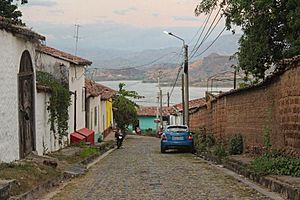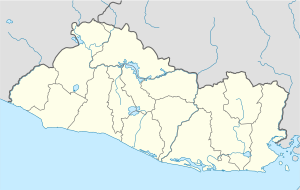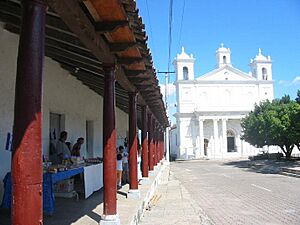Suchitoto facts for kids
Quick facts for kids
Suchitoto
|
|
|---|---|
|
Municipality
|
|

Suchitoto, El Salvador
|
|
| Country | |
| Department | Cuscatlan |
| Indigenous Peoples | Nahuat |
| Elevated to Villa | March 22, 1836 |
| Elevated to City | July 15, 1858 |
| Elevation | 1,086 ft (331 m) |
| Population
(2007)
|
|
| • Municipality | 24,786 |
| • Urban | 7,654 |
Suchitoto is a beautiful town in El Salvador. It is located in the Department of Cuscatlán. People have lived here for a very long time, even before the Spanish arrived. The first founding site of the city of San Salvador was actually located in Suchitoto in 1528.
Suchitoto faced tough times during the civil war in El Salvador from 1980 to 1992. Its population dropped a lot during this period. However, the town has grown and become a popular place to visit. Many tourists come to see its old colonial buildings and cobblestone streets. These features make it feel like stepping back in time.
Because of tourism, many new businesses have opened. You can find hostels, restaurants, and cute cafes here. This growth has also led to more art and cultural places. These places offer great opportunities for young people in the community. In 2007, Suchitoto had about 24,786 people. About 7,654 lived in the main town area.
Contents
Exploring Suchitoto's Past
Early Inhabitants and Spanish Arrival
The area around Suchitoto was home to the Nahua people. They lived there long before the Spanish explorers came. When the Spanish arrived, the area was already very populated.
The Spanish first tried to set up the town of San Salvador in 1525. Its exact location is not known. Later, in April 1528, they re-established San Salvador. This new site was about 12 kilometers from Suchitoto. Diego de Alvarado led this effort, following orders from Jorge de Alvarado.
The new town, named after the Holy Trinity, faced many challenges. Local people resisted the Spanish settlers. Also, a person named Martín de Estete tried to take control. Around 1539, the settlers started moving again. They moved to the Hamacas Valley, where San Salvador is today. The move was officially approved in 1545. By 1550, Suchitoto had about 600 residents.
Suchitoto was important because of its good location. It was the main church center for a large area. In 1770, a report by Pedro Cortés y Larraz said there were about 43 "tributary Indians." This meant the population was around 215 people.
Suchitoto in the Republic Era
When El Salvador became a republic, Suchitoto became part of the San Salvador department. This happened on June 12, 1824. In 1835, Suchitoto was made the main town for the Cuscatlán department. It was also part of the Suchitoto district.
Suchitoto was officially recognized as a town on March 22, 1836. During this time, there were many conflicts in Central America. General Francisco Morazán visited Suchitoto in 1839. He was trying to stop an advance by Francisco Ferrera.
The Creation of Lake Suchitlán
How the Lake Was Formed
Today, Suchitoto is known for Lake Suchitlán. But this lake is not natural. It was created in the mid-1970s. This happened because of the Cerron Grande Hydroelectric Dam project. The government of El Salvador built this dam to make electricity from water power.
Building the dam caused a lot of land to flood. Because of this, 13,339 people had to leave their homes. About 9,000 people moved to other communities. The rest received some money for their properties. The project affected four different departments: Chalatenango, Cuscatlan, San Salvador, and Cabanas. Many towns were impacted, including Suchitoto.
The Dam Project Details
The dam project started on August 4, 1972. It was a plan by President Arturo Armando Molina's government. The goal was to build a dam on the Rio Lempa. Two large turbines were planned to produce 67.5 megawatts of power each. These would add to existing turbines on other rivers.
The project was promoted as a solution to the country's energy needs. It was built 22 kilometers upstream from another dam on the Rio Lempa. This location was between Potonico in Chalatenango and Jutiapa in Cabanas. The construction caused 2,180 million cubic meters of water to flood. This created the artificial Lake Suchitlan, which is about 135 square kilometers.
As a result of the lake, 24 old archaeological sites were covered by water. Also, several small communities, called cantons and caserios, disappeared. These included Canton El Tablon and Canton San Juan in Suchitoto.
Suchitoto is a Sister City with Prescott, Arizona in the United States. This means they have a special friendship and partnership.
Images for kids
See also
 In Spanish: Suchitoto para niños
In Spanish: Suchitoto para niños
 | Tommie Smith |
 | Simone Manuel |
 | Shani Davis |
 | Simone Biles |
 | Alice Coachman |




